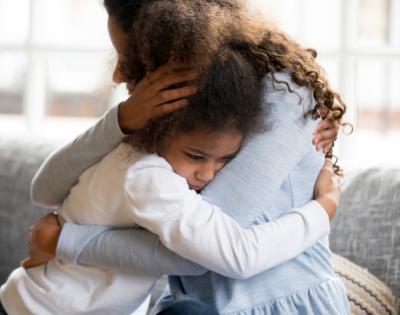
Fear. Worry. Anger or irritation. Insomnia. Anxiety can have many faces. Sometimes, it’s the face of your child. Anxiety disorders are the most common mental health issue of childhood and adolescence, the Child Mind Institute reports. According to the Centers for Disease Control and Prevention, 9.4% of kids ages 3 to 17 have been diagnosed with anxiety, and reports show it’s on the rise.
To answer some of the questions you might have about kids and anxiety, we've compiled answers to common questions about children experiencing symptoms of anxiety and how parents can help.
FAQ: Kids and Anxiety
Who does anxiety typically affect?
There’s often a stereotype that anxiety mainly affects adults, particularly females. However, anxiety can and does affect every gender and every age. We can even identify symptoms of anxiety in infants. Although anxiety is seen more frequently in what some might refer to as “Type A personalities” – people who are high-achieving or involved in jobs or activities that create high pressure – we see anxiety manifest itself in different types of people, and in different ways. For example, some people might withdraw when feeling anxious, because they feel that they can’t cope. Others may show irritability and snap at those around them.
When do kids begin to struggle with anxiety?
Often, traumatic or unsettling experiences or situations will contribute to anxiety. Other times, it seems to come out of nowhere. It can even start in infancy.
What does anxiety look like in kids?
Children present themselves very differently when they experience anxiety. You might notice your child being uncomfortable in situations even when they’re familiar with their surroundings. Perhaps they’re afraid to try new things or worried about “what ifs.” Another common sign can be physical symptoms, like headaches, stomachaches or vomiting.
Why are we seeing more kids struggling with anxiety?
Kids have so much more pressure on them these days, which seems to only increase every year. As children are often involved in numerous activities outside of school, they have minimal opportunities to engage in downtime to reset themselves and have free play.
What tools can be useful for kids to cope with anxiety?
It’s really important for kids to be aware of how their bodies are feeling, and to be able to identify their emotions. Breathing is huge for kids. If they can learn how to belly breathe, they can use this skill at any time in any place to help decrease anxiety. Another tool that works well with kids is progressive muscle relaxation, which is the tightening and relaxing of muscles. However, the best tool is a supportive caregiver that can walk them through the steps of identifying their feelings and using coping skills.
How can parents help their kids?
Parents can help their kids deal with anxiety by talking openly about mental health and feelings. The hope is that children never feel that what they’re experiencing is “taboo,” and that they have safe people in their lives they can talk to if they’re struggling. Parents should never be afraid to reach out to a professional if they’re feeling unsure about how to manage their child’s anxiety, or even if they’re unsure of what their child might be dealing with.
How can a therapist help a child who has anxiety issues?
At The Village, we see lots of children dealing with anxiety. It’s a common challenge, and kids really benefit from seeing a therapist to help them and their family explore how this is impacting their lives, as well as gain some tools to use when they're feeling anxious. Most importantly, it’s important for kids to have a safe and supportive place to share their struggles and their feelings.
The Village Family Service Center enhances lives across North Dakota and Minnesota through behavioral health services, including mental health counseling, addiction treatment, and in-home family therapy. To schedule a counseling session, call 1-800-627-8220 or request an appointment online.




